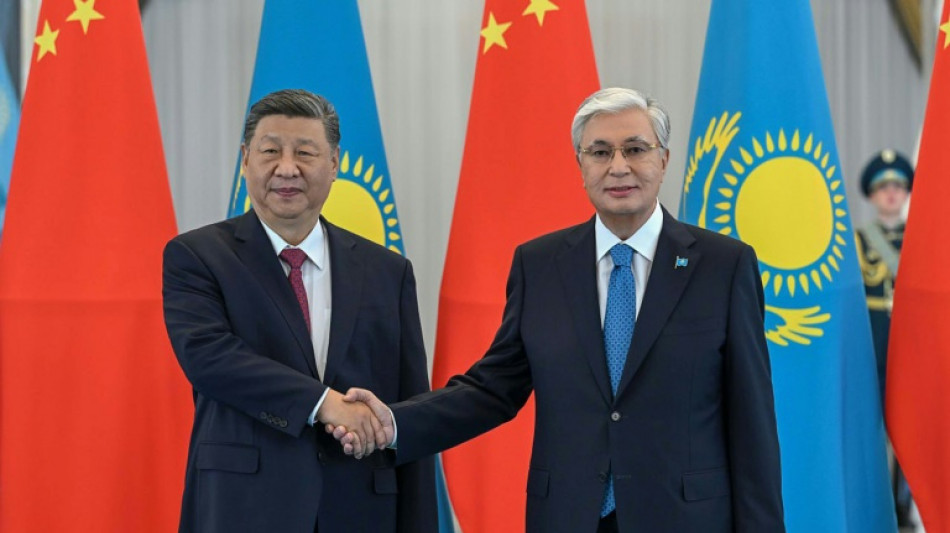
-
 Marc Marquez on brink of MotoGP title as Bagnaia wins Japan sprint
Marc Marquez on brink of MotoGP title as Bagnaia wins Japan sprint
-
In-form Swiatek cruises past wildcard to start China Open title bid
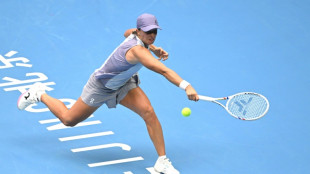
-
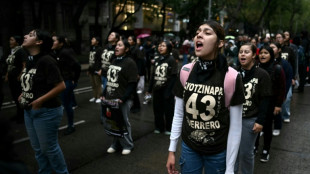 Protesters demand answers 11 years after Mexican students vanished
Protesters demand answers 11 years after Mexican students vanished
-
Paris Fashion Week to showcase industry makeover with string of debuts

-
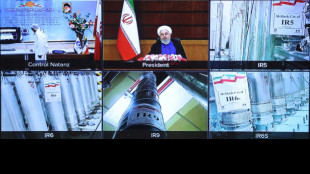 'Snapback': What sanctions will be reimposed on Iran?
'Snapback': What sanctions will be reimposed on Iran?
-
UN sanctions on Iran set to return as nuclear diplomacy fades
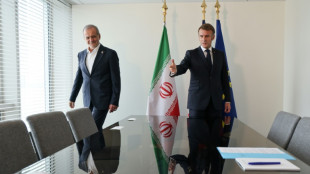
-
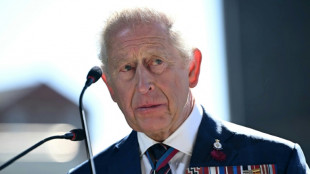 King Charles III to visit Vatican in October
King Charles III to visit Vatican in October
-
Marc Marquez third on grid at Japan MotoGP as Bagnaia takes pole

-
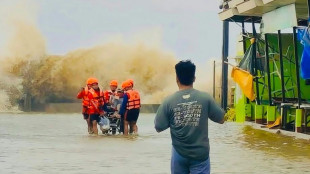 Philippines death toll rises to 11 as storm Bualoi bears down on Vietnam
Philippines death toll rises to 11 as storm Bualoi bears down on Vietnam
-
Donald excited Europe handled raucous crowd well at Ryder Cup

-
 Goals, guns and narcos: Hitmen plague Ecuador's beautiful game
Goals, guns and narcos: Hitmen plague Ecuador's beautiful game
-
Argentine victims of live-streamed murder laid to rest on eve of protest
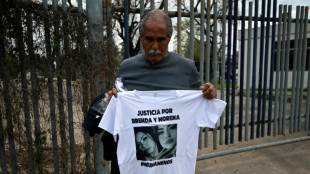
-
 No USA Ryder Cup panic as fightback enters Bradley's plan
No USA Ryder Cup panic as fightback enters Bradley's plan
-
USA turns to Scheffler, DeChambeau in Saturday foursomes

-
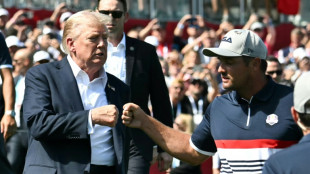 Trump can't spark US comeback in visit to Ryder Cup
Trump can't spark US comeback in visit to Ryder Cup
-
Trump urges Microsoft to fire ex-Biden administration official
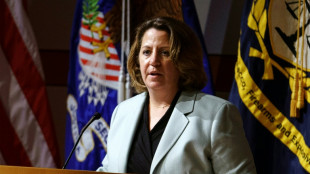
-
 Europe takes three-point Ryder Cup lead as US gets no Trump boost
Europe takes three-point Ryder Cup lead as US gets no Trump boost
-
Three talking points ahead of the Women's Rugby World Cup final

-
 Murillo sends Marseille top in Ligue 1 with late win in Strasbourg
Murillo sends Marseille top in Ligue 1 with late win in Strasbourg
-
Kimmel boycott ends as US TV companies put him back on air

-
 Kane scores twice to reach 100 Bayern goals in record time
Kane scores twice to reach 100 Bayern goals in record time
-
'Almost impossible': Brazilian skater Sandro Dias makes history on mega ramp

-
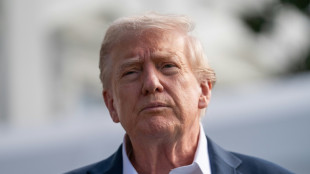 Trump targets more opponents after 'dirty cop' Comey
Trump targets more opponents after 'dirty cop' Comey
-
Sixers' Embiid eyes consistency after injury-plagued NBA season

-
 More questions than answers surround Trump's TikTok deal
More questions than answers surround Trump's TikTok deal
-
Iran sanctions look set to return as last-ditch UN push fails
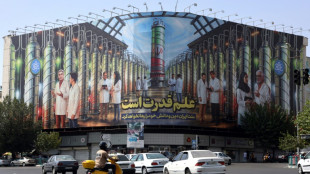
-
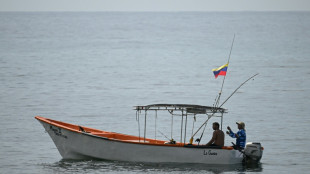 Sitting ducks: Venezuelan fishermen wary of US warships
Sitting ducks: Venezuelan fishermen wary of US warships
-
Nissanka ton in vain as India edge Sri Lanka in Super Over

-
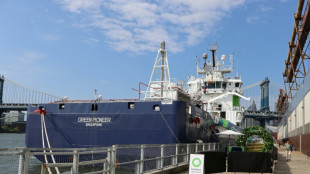 An Aussie tycoon bets billions on cleaning up iron ore giant
An Aussie tycoon bets billions on cleaning up iron ore giant
-
Civil defence says 50 killed in Gaza as Netanyahu vows to 'finish job' against Hamas
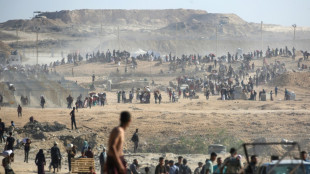
-
 Canada's Corrigan leans on Olympic experience in quest for Women's Rugby World Cup gold
Canada's Corrigan leans on Olympic experience in quest for Women's Rugby World Cup gold
-
Kolisi warns 'resilient' Boks are braced for Puma mauling

-
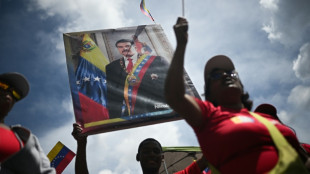 Fearing US invasion, Venezuela to hold emergency drills
Fearing US invasion, Venezuela to hold emergency drills
-
Greek PM warns Israel risks losing friends
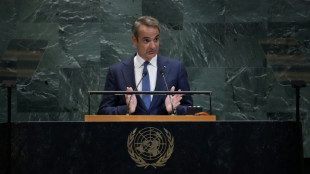
-
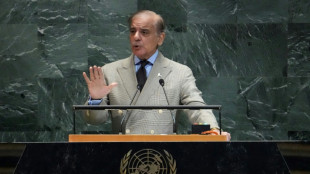 Pakistani PM appeals for India talks, hails Trump role
Pakistani PM appeals for India talks, hails Trump role
-
Trump aims to make America great again amid Ryder Cup woes
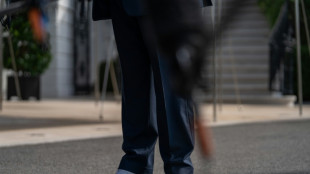
-
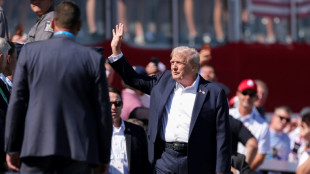 Trump arrives at Ryder Cup with US seeking comeback
Trump arrives at Ryder Cup with US seeking comeback
-
Europe grabs 3-1 lead as US seeks Trump boost at Ryder Cup

-
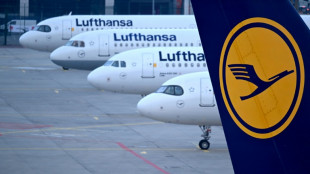 Lufthansa planning thousands of job cuts: sources
Lufthansa planning thousands of job cuts: sources
-
China at UN warns of return to 'Cold War mentality'
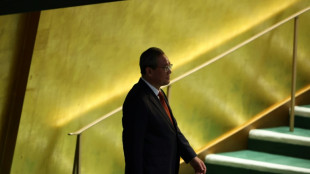
-
 England great Alphonsi expects Canada to shine in Women's Rugby World Cup final
England great Alphonsi expects Canada to shine in Women's Rugby World Cup final
-
Tottenham reject interest in reported record £4.5bn sale
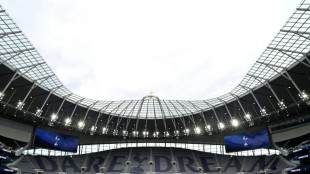
-
 Man Utd boss Amorim admits uncertainty ahead of Brentford clash
Man Utd boss Amorim admits uncertainty ahead of Brentford clash
-
Zverev wins Beijing opener as Gauff launches title defence

-
 Barca duo Raphinha, Joan Garcia injured, out for PSG clash
Barca duo Raphinha, Joan Garcia injured, out for PSG clash
-
Trump hopes more opponents to be charged after 'dirty cop' Comey
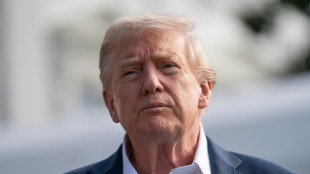
-
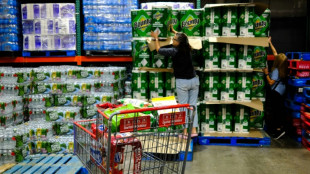 US Fed's preferred inflation gauge rises, with more cost pressures expected
US Fed's preferred inflation gauge rises, with more cost pressures expected
-
Facebook, Instagram to offer paid ad-free UK subscriptions

-
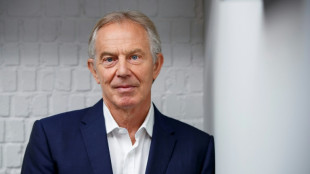 Former UK PM Blair could lead transitional authority in Gaza: reports
Former UK PM Blair could lead transitional authority in Gaza: reports
-
Netanyahu says Palestinian state would be 'national suicide' for Israel
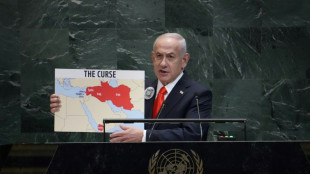

China's Xi in Kazakhstan to cement Central Asia ties
Chinese President Xi Jinping will meet Central Asian leaders at a summit in Kazakhstan on Tuesday, his second trip to the region in under a year as Beijing competes with Russia for influence there.
The summit in the Kazakh capital brings together Xi -- who arrived in Astana on Monday -- and the leaders of Kazakhstan, Kyrgyzstan, Uzbekistan, Tajikistan and Turkmenistan.
Under Russia's orbit until the fall of the Soviet Union in 1991, the five countries of Central Asia have courted interest from major powers including China and the United States since becoming independent.
The region is rich in natural resources and strategically located at the crossroads of Europe and Asia.
While Central Asian leaders continue to view Russia as a strategic partner, ties with Moscow have loosened since the war in Ukraine.
The five nations are taking advantage of the growing interest in their region and coordinating their foreign policies.
They regularly hold summits with China and Russia to present the region as a unified bloc and attract investment.
The "5+1" format high-level talks have also been organised with the European Union, the United States, Turkey and other Western countries.
"The countries of the region are balancing between different centres of power, wanting to protect themselves from excessive dependence on one partner," Kyrgyz political scientist Nargiza Muratalieva told AFP.
- Biggest trade partner -
Russia says China's growing influence in the region does not pose a threat.
"There is no reason for such fears. China is our privileged strategic partner, and the countries of Central Asia, naturally, are our natural historical partners," Kremlin spokesman Dmitry Peskov told reporters on Monday.
But China has now established itself as Central Asia's leading trading partner. Trade volume with the region was estimated at $95 billion in 2024, according to Chinese customs.
That figure is far ahead of the European Union (around $64 billion according to the EU Council in 2023) and Russia, with $44 billion.
Central Asia is also an important target for China in its Belt and Road initiative -- which uses huge infrastructure investments as a political and diplomatic lever.
Xi's visit to Kazakhstan will "(open) up more room for the joint construction of the Belt and Road", Chinese foreign ministry spokesman Guo Jiakun said on Monday.
Construction of the Uzbekistan-Kyrgyzstan-China railway and the China-Tajikistan highway, which runs through the Pamir Mountains to Afghanistan, are among the planned investments.
New border crossings and "dry ports" have already been built to process trade, such as Khorgos in Kazakhstan, one of the largest logistics hubs in the world.
"Neither Russia nor Western institutions are capable of allocating financial resources for infrastructure so quickly and on such a large scale, sometimes bypassing transparent procedures," said Muratalieva.
Developing transport corridors in Central Asia allows China to reduce delivery times by sending goods to Europe via the Caspian Sea, bypassing Russia.
Chinese companies are also increasingly present in Central Asia's energy sector, seeking contracts for gas in Turkmenistan, uranium in Kazakhstan and rare earths in Tajikistan, among others.
Kazakhstan said last week that Russia would lead the construction of its first nuclear power plant but that it wanted China to build the second.
"Central Asia is rich in natural resources such as oil, gas, uranium, gold and other minerals that the rapidly developing Chinese economy needs," Muratalieva said.
"Ensuring uninterrupted supplies of these resources, bypassing unstable sea routes, is an important goal of Beijing," the analyst added.
- Human rights -
China also positions itself as a supporter of the predominantly authoritarian Central Asian leaderships.
At the last Central Asia-China summit, Xi called for "resisting external interference" that might provoke "colour revolutions" that could overthrow the current leaders in the region.
"Central Asia directly borders Xinjiang... Beijing sees the stability of the Central Asian states as a guarantee of the security of its western borders," Muratalieva added.
Beijing is accused of having detained more than a million Uyghurs and other Muslims as part of a campaign which the UN has said could constitute "crimes against humanity".
Central Asia remains sparsely populated and has just 80 million inhabitants despite being as geographically large as the European Union.
This is far less than the 1.4 billion Chinese population, now exempt from visa requirements in some countries of the region.
Some in Central Asia are concerned by this arrangement and fear a loss of sovereignty.
G.Frei--VB
